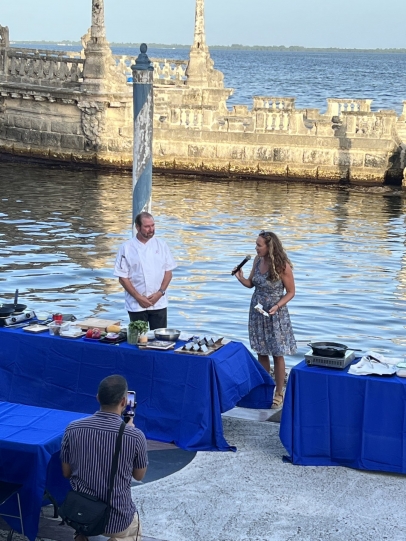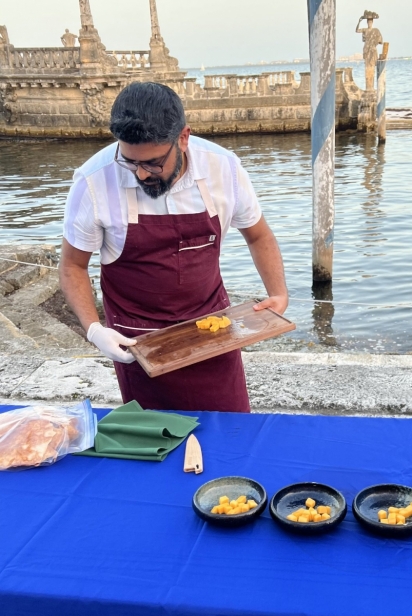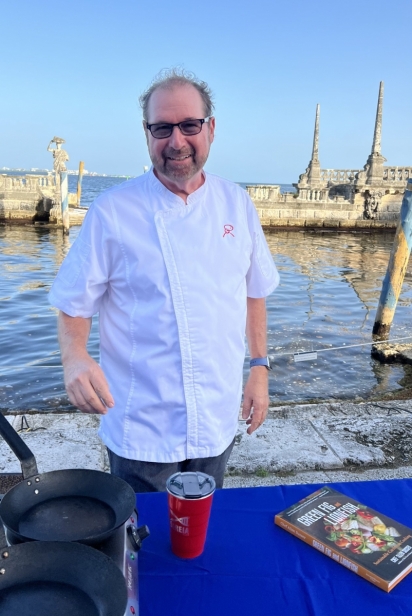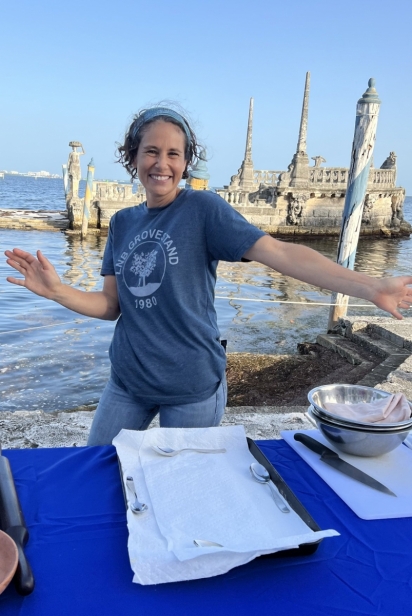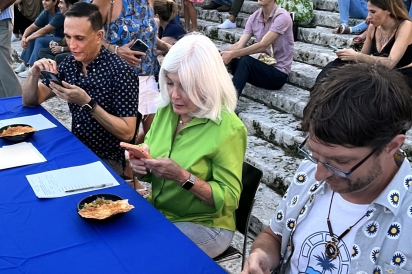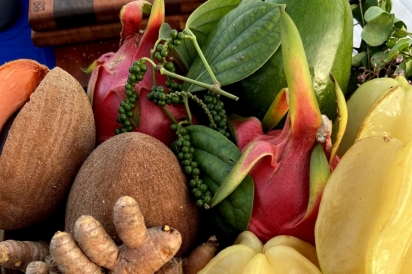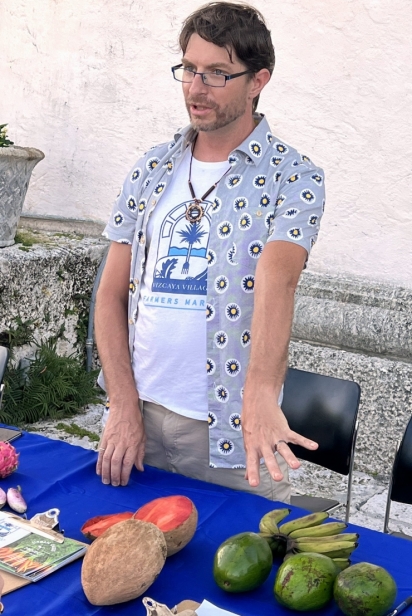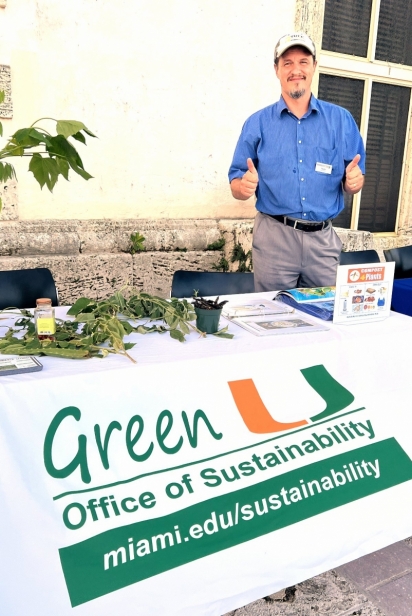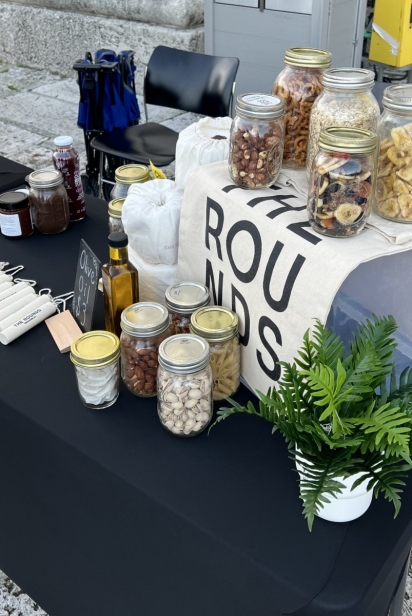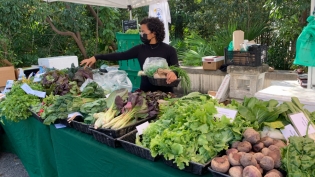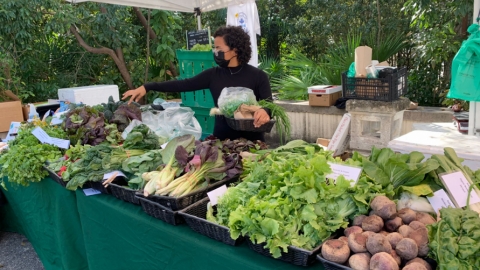Chefs Bring Climate Change Awareness at Vizcaya Series
What’s the impact of climate change on the food we eat? In South Florida, warming seas affect marine life and seafood. Higher temperatures has an impact on tropical fruits and vegetables that grow here.
Three South Florida chefs created meals using ingredients aimed at highlighting our changing climate and sustainable practices as part of Vizcaya’s Climate Collaborative series. Participants were chef Niven Patel of Ghee Indian Kitchen, Orno and Mamey; chef Allen Susser, a James Beard Award winner, author and co-chair of Slow Fish Miami and chef Adena Ellenby, a second-generation tropical fruit farmer.
Joining the chefs in the event was Slow Fish co-chair Sarah Curry of Sereia Films, whose mission is to educate consumers to make smarter seafood choices to make sure there are fish in the ocean for future generations. “The seafood industry is complicated, and there is usually not a straightforward solution,” says Curry. “We talk with experts in the industry to help us gain a greater understanding of all that goes into getting seafood on our dinner plates.”
One of the chefs’ seafood choices was Bluehouse salmon, farmed in their new facility in Homestead. Their salmon, grown in tanks using recycled and filtered waters, avoids the wastes, hormones, microplastics, parasites, pesticides and antibiotics associated with sea-based fish farming. No harmful toxins are released into ocean waters. Bluehouse salmon is distributed by truck from Florida across the U.S., so it reaches consumers at a fraction of the carbon footprint of imported salmon. Chef Niven Patel cured the salmon and served it with fresh carambola and local mango, accompanied with toasted flatbread.
For his dish, chef Allen showcased lionfish, an invasive species threatening the well-being of coral reefs and marine ecosystems. Native to the tropical waters of the South Pacific and Indian Ocean, lionfish were first spotted off Florida’s coasts in the mid-1980s and have quickly spread north and south, feeding on prey normally consumed by snapper, grouper and other commercially important native species. Harvesting them for consumption is one way of tackling lionfish populations. Chef Allen, who served the judges lionfish tacos with tropical produce, has also written the cookbook Green Fig and Lionfish.
Adena Ellenby, whose parents, Marc and Kiki, started LNB Farms, their tropical fruit business, came up with a dish using more than a dozen plants that grow on their farms, including mamey sapote, turmeric, ginger, dragonfruit, avocado, starfruit and fresh peppercorns. She created two different kinds of fish tacos using African pompano, caught by her brother, Levi. Ellenby and her husband, Walt Adler, run their weekend LNB Grovestand, selling tropical fruit smoothies and other produce from their farms.
For the competition, the chefs had 30 minutes to prepare their dishes on the waterfront East Terrace of Vizcaya. Judges Pat Mackin, David Hardy and Art Friedrich were asked to evaluate the dishes based on presentation, flavor, originality and use of relevant ingredients. The winner: Adena Ellenby, whose tropical fish tacos impressed the judges for their inventive use of all-local produce.
Other partners at the event included:
• Urban Oasis Project, which runs farmers markets including the Sunday market at Vizcaya, builds gardens and supports food justice efforts.
• Green U at the University of Miami, in charge of increasing sustainability throughout the University while educating its community to be better stewards of the environment.
• United Nations Association, Miami Chapter, a movement of Americans who believe that our interests and values can best be advanced by standing with the United Nations.
• Slow Fish Miami and Sereia Films, educating the public about making smart seafood choices.
• The Rounds, a zero-waste service that delivers staples in reusable containers to neighborhoods. mainly via efficient e-bikes.
For more information about future events in the Climate Collaborative series, visit Vizcaya Museum and Gardens.


